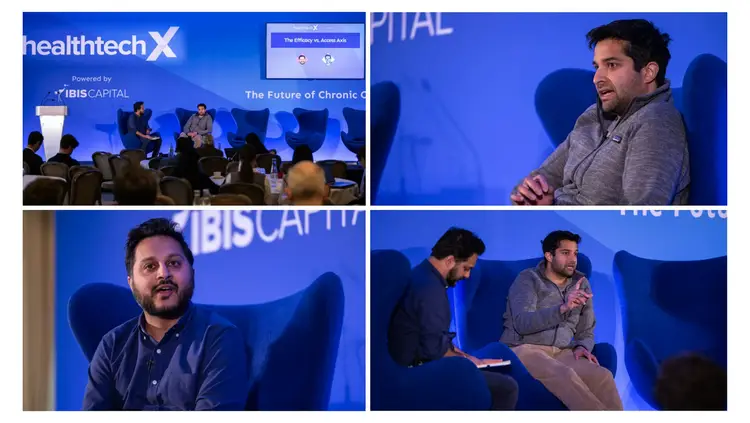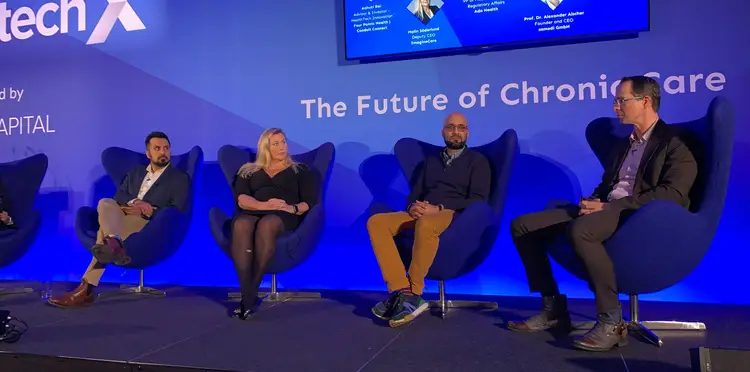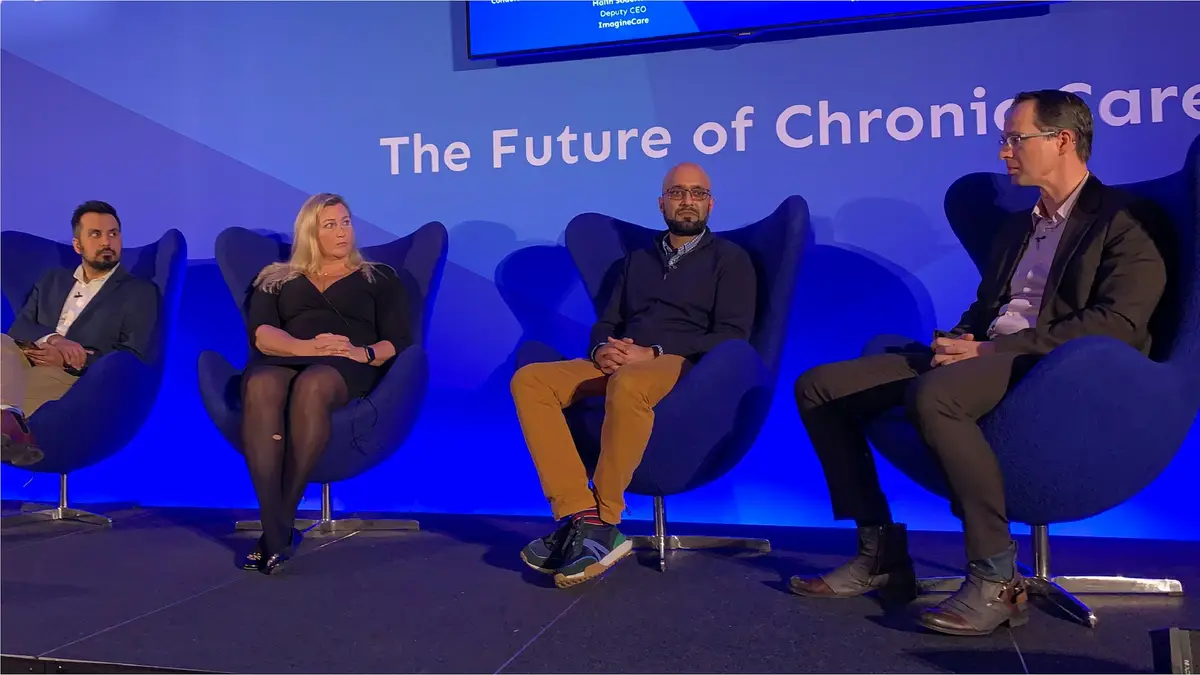We recently had the chance to attend HealthTechX in London alongside some of the best and brightest names in digital health.
The theme of the day was “The Future of Chronic Care”, covering a wide range of thought-provoking discussions about how technology like Ada’s can improve health outcomes and address the biggest challenges faced by patients, clinicians, and health systems today.
The event brought the UK’s health tech community together under one roof, and Ada’s experts were invited to participate in two separate panels during the day.
The Efficacy vs Access Axis
Dr. Shubs Upadhyay, our Director of Medical Quality, was joined on stage by former Ada colleague Dr. Vishaal Virani (now Head of Health for YouTube in the UK and Ireland) to discuss “The Efficacy vs Access Axis”. They focused on how technology could improve accessibility in healthcare and boost the impact of in-person consultations.
Shubs and Vishaal spoke about the importance of finding the right balance between improving access and improving outcomes – to provide the best possible value for patients, doctors, and health systems.

Shubs (left) and Vishaal in discussion. Photo: HealthTechX
There’s a universal shortage of healthcare workers, and the burden on clinicians has never been greater – but at the same time, thanks to technology, patients and individuals with health concerns theoretically have more access to healthcare information than ever before. Greater access to information comes with enormous benefits, helping individuals to understand more about their health, how they can protect it, and when to seek medical attention. However, this information is not always helpful for patient journeys.
Firstly, not all healthcare information is equal, as anyone who has searched for their symptoms online only to read a panic-inducing list of potential diseases will understand. It’s often hard to determine who has authored online resources, and how reliable they are – yet, with health systems overburdened, many individuals are placing trust in on-demand online sources in lieu of real-life clinical support.
Secondly, even accurate and accessible online health information can create problems for clinicians and patients if it does not align with the health system’s local service provision and availability, and offer reliable, personalized next steps for users. Poor advice leads to unnecessary trips to the doctor, which can in turn increase the strain on clinicians while preventing or delaying access to services for those most in need.
Shubs and Vishaal discussed how technology like Ada, when deployed in the right way, can avoid these problems and improve both access and effectiveness in healthcare. Ada is certainly an example of the power of technology to improve access to healthcare, with over 35 million assessments conducted, at no cost to the patient.
Because our database is clinically validated, curated, and managed by experienced human doctors, and because we offer clear guidance on the best next steps after every assessment, we are able to ensure that users receive helpful and highly accurate information. At the same time, by embedding our assessment and care navigation technology within health systems, patient and clinician-facing channels, we support patients to better access more appropriate services at the right time, save time for clinicians, help them make the most informed decisions possible, and free them up to focus on improving patient outcomes.
Ada’s clinical teams work closely with our partners’ clinicians to ensure that our integration embeds smoothly into their workflow and that we are providing value at every step of the way.
The Continuum of Care
Later in the day, our VP of Medical Safety and Regulatory Affairs, Dr Tauseef Mehrali, took part in a lively panel entitled “Hospital to Home – Enabling the Continuum of Care” alongside leading figures providing digital front door and remote patient monitoring technology.
Tauseef, alongside Alexander Alscher of Samedi, Malin Söderlund of ImagineCare, Rajiv Tanna of Birdie, and moderator Aahuti Rai discussed the ways that healthtech providers can scale sustainably while bridging the gap between hospital and home-based care solutions.

L-R:, Rajiv Tanna, Malin Söderlund, Tauseef Mehrali, Alexander Alscher
Our core commitment at Ada is always to patient safety and to provide high-quality, safe, and accurate symptom assessment and care navigation technology. This commitment to quality has helped us integrate deeply with major health systems and life sciences companies to empower clinicians and patients alike to deliver great health outcomes. We can play a crucial role for patients beginning their healthcare journeys, and make sure they get to the right care at the right time.
Our product philosophy plays a crucial role in this.
At Ada, we focus on usability – our experience developing a product used by millions of people in the real world has helped us build Ada into a technology that can be used just as easily by an individual carrying out their first health assessment as it can by a busy clinician during a consultation. This approach allows us to help people use their phones to access the right care and information at the point of need, improving outcomes along the way.
The on-demand, digital care journeys we operate in collaboration with our life sciences and pharmaceutical partners are an example of this philosophy in action. By providing users with a mobile-first way to accelerate their path to consultation, diagnosis, and treatment, we can play an important role in boosting access to healthcare and improving outcomes for patients.
We launched our first Care Journey in collaboration with Pfizer in 2023 to help those at risk of severe COVID-19 access timely consultation and (if appropriate) treatment, and we are actively working with major life sciences companies to expand this product to other conditions and support faster, more equitable, and more convenient access to treatment.
Tauseef also spoke about our integrations with health systems such as Sutter Health and Jefferson Health, and how we tailor Ada to their requirements and help them navigate patients through complex healthcare processes. Being cloud-based and not needing to install on-site servers means this technology is also scalable and mobile-first, helping us amass a global user base, partner with even more health systems, and enable more people to start healthcare journeys with confidence.
We were thrilled to be involved in important discussions about the potential of health tech to improve patient outcomes and boost the quality of care for all. Look out for future updates from other engaging events, and continue to improve our product, scale globally, and deliver high-quality assessments to tens of millions.
You can also read HealthTechX’s summary of Shubs’ discussion with Vishaal on Medium here.

L-R: Shubs and Tauseef
